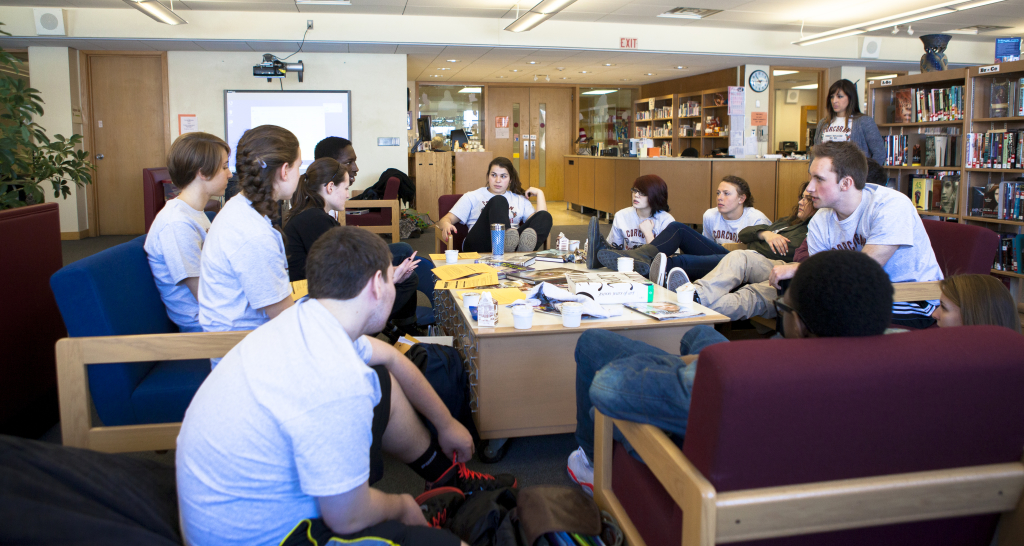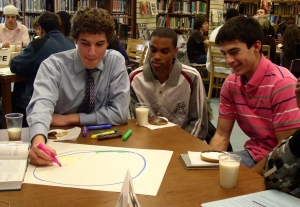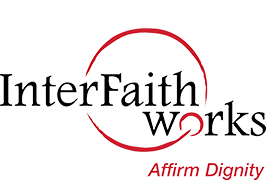The current post is by Karen Calenzo, the El-Hindi Center for Dialogue’s Starting Small Coordinator, detailing the school dialogue exchange programs.
September is an exciting time of year for the Center for Dialogue. As the school doors open, the Starting Small School Exchange Program begins to set the stage for positive relationship building in the schools.
Facilitated “exchanges” among youth of different racial and ethnic backgrounds in schools throughout Onondaga and Madison counties bring an opportunity to spark conversations that build bridges of understanding and create lasting relationships leading to a lifetime of openness. Throughout the fall, eight to ten high schools begin to schedule their exchanges to stretch over five months. In the spring, six elementary schools begin to build their connections with children, literally from around the world.
 This work began in 2002 when two high schools, Nottingham and Fayetteville-Manlius, engaged in a partnership as the first full high school exchange program on anti-racism running in the Syracuse area. The exchange discussions, done in small group settings, helped student participants of diverse backgrounds break down misconceptions about race and ethnicity. Stereotyping and its origins, the meaning of white privilege, the ramifications of institutional racism and the power of being an ally, are topics and issues raised that influence critical thinking and perspectives about the community in which young people live. It became clear to us that introducing younger children to different cultures and ethnicities in the early grades, as well as concepts of fairness and racial justice, could begin to set the stage for healthy attitudes and loving relationships later in school and life. Thus, the birth of the elementary exchange day program and the middle school exchanges, as well. Over time, the power and success of this exchange program spread to the other Syracuse city schools and surrounding suburbs, growing to include over 16 elementary, middle and high schools.
This work began in 2002 when two high schools, Nottingham and Fayetteville-Manlius, engaged in a partnership as the first full high school exchange program on anti-racism running in the Syracuse area. The exchange discussions, done in small group settings, helped student participants of diverse backgrounds break down misconceptions about race and ethnicity. Stereotyping and its origins, the meaning of white privilege, the ramifications of institutional racism and the power of being an ally, are topics and issues raised that influence critical thinking and perspectives about the community in which young people live. It became clear to us that introducing younger children to different cultures and ethnicities in the early grades, as well as concepts of fairness and racial justice, could begin to set the stage for healthy attitudes and loving relationships later in school and life. Thus, the birth of the elementary exchange day program and the middle school exchanges, as well. Over time, the power and success of this exchange program spread to the other Syracuse city schools and surrounding suburbs, growing to include over 16 elementary, middle and high schools.
The current high school exchange program continues to be built on the above mentioned tenets, with the goal of leading to behavioral changes and social action for racial equity. In addition, dialogue is learned as a skill and a method of producing racial justice. The dialogue process is about finding common ground, listening to others so we can critically reflect on our own beliefs, and seeking to understand how we are connected to each other through our participation in something larger than ourselves.
 In recent years, as the curriculum evolved, it has become increasingly important to keep our discussions and activities relevant to timely events. YouTube clips dealing with current issues have proven to be a successful catalyst for dialogue. In addition, music lyrics and videos have allowed us to take a look at the overall effect of media on these conversations. Another springboard for dialogue was taken from the popular “What Would You Do If…?” television scenarios that bring real-life situations on moral dilemmas to life. TED Talks will be incorporated this year, either as clips or short full runs, as a way to highlight new understanding and thought about racism in America and to engage students in rich dialogue on the issues.
In recent years, as the curriculum evolved, it has become increasingly important to keep our discussions and activities relevant to timely events. YouTube clips dealing with current issues have proven to be a successful catalyst for dialogue. In addition, music lyrics and videos have allowed us to take a look at the overall effect of media on these conversations. Another springboard for dialogue was taken from the popular “What Would You Do If…?” television scenarios that bring real-life situations on moral dilemmas to life. TED Talks will be incorporated this year, either as clips or short full runs, as a way to highlight new understanding and thought about racism in America and to engage students in rich dialogue on the issues.
Talking about racism and race relations is hard. The wounds are deep and centuries old. People bring many emotions to the discussion – anger, guilt, grief, rage and fear, just to name a few. The dialogue circles will surface some of these sentiments, and we welcome the opportunity to openly and honestly listen to each other’s experience and feelings. We also hope to bring relevant historical background to the forefront to increase clarity about the issues surrounding institutional racism. This is one of the most important steps in healing and moving to action.
